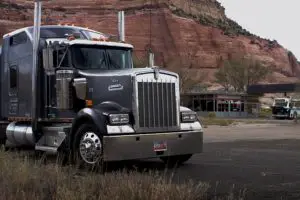Being a truck driver is a difficult but fulfilling life. With such a large driver shortage there are more driver jobs out there now than ever before. This shortage has had a positive impact on the salaries for drivers. Trucking companies are now paying more for entry-level drivers than they have in many years. Becoming a driver can be a difficult decision, but once the decision is made there are many options to consider, and two of the biggest ones are if you should work for a company and drive their trucks or if you should purchase your own and drive that truck. When deciding between the two, you won’t see too much of a difference while out on the road, because in each situation, you’ll be behind the wheel and driving. As you’ll see below, there are significant differences in the two when you aren’t actually driving.
Company Driver
As a company driver, it is the company’s responsibility to keep you rolling. They want to make money too, and if they have idle trucks, they are not making any money at all. So, they will keep finding loads. That is a good thing. On the other side of the same coin, the company wants to make money and will keep you rolling, and you may not always get the home time you want or time off you requested. Still, this is possible with any job.
Another good thing about being a company driver is that if your rig has any issues, needs any maintenance, or the regular PM service is due you do not have to pay for it at all. It is something that is paid for by the company. This means more money in your pocket and less stress having to deal with these issues.
Owner Operator
Being an owner-operator means that you are responsible for all of the costs. You are the sole employee running your own trucking company. You are not just responsible for purchasing a truck, but you are also responsible for keeping that truck on the road. You have to pay for truck insurance, freight insurance, and fuel. The cost of fuel is deceitfully expensive and is one of the biggest costs associated with owning a truck.
 When a person is an owner-operator, they are known as an owner-op, and you might see it abbreviated as an O/O. An O/O has many costs, and that might be one of the reasons that there are so many companies looking for O/O’s so that they can still make money but reduce costs and liabilities. Still, as an owner-operator, there is a better chance for a larger income.
When a person is an owner-operator, they are known as an owner-op, and you might see it abbreviated as an O/O. An O/O has many costs, and that might be one of the reasons that there are so many companies looking for O/O’s so that they can still make money but reduce costs and liabilities. Still, as an owner-operator, there is a better chance for a larger income.
One of the challenges to being an O/O is finding loads. If this is a part of the job that you don’t enjoy, but you don’t want to work for a company as a full-time employee, you do have a middle ground option. You can find a company that is will to sign a freight exclusively with them. This has many benefits such as the power of a larger company can mean higher rates. The drawback to working with a single company you are restricted to what you can haul.
If you aren’t interested in signing an exclusivity with a company, you will need to find loads on your own. Fortunately, this is much easier today due to the internet than it was just a couple decades ago. Nowadays, there are websites such as GetLoaded.com and InternetTruckStop.com that are dedicated to finding loads for truckers.
Company lease driver
A company lease driver is a third option that you have when deciding what type of commercial truck driver you want to become. In this scenario, the driver enters into a lease of a truck. All truck payments and fuel costs are automatically deducted from the driver’s settlement (this is what a truck drivers’ paycheck is called) before it is deposited into their banking account.
If you look online or ask other drivers, you will find mixed reviews on how this setup works. If you are not good at managing your money, this option can create a tremendous strain on your financial stability. If you don’t manage your financials correctly, it can feel like your entire check is going towards the payment of your truck which is not a great feeling.
I recommend staying away from the lease option. If you want to own a truck save up for a down payment and get a loan on it where you can choose where you want to work and not be stuck with a single company.
Breakdowns
It’s always amazed me at how much wear and tear our trucks can take. The monsters pull thousands of pounds of cargo back and forth across the country in extreme weather conditions. Due to these conditions, it goes without saying that it’s a matter of time before you experience a breakdown. The good thing about being a company driver is that you will not be responsible for those charges. If you are a OO, those expenses will be coming out of your pocket. The costs on even the most minor repairs on a semi-truck can be shocking if you haven’t prepared for it or haven’t saved funds to pay for it.
Below are some general annual estimates on the cost to operate a commercial truck in the United States:
- Fuel – Approximately $60,000 – $70,000 per year
- General Maintenance – $15,000 per year
- Tires Repairs and Replacement – $5,000 per year
Being Home
When I first started driving, as soon as I left all I could think of was when I would be able to get home. Home time is very important for most drivers. When you are first starting out over the road, be prepared to be gone for weeks at a time, and only be home for a 34-hour reset.
The positive to working for a company is the fact that they are lining up your work and trying to keep you busy so that you both are making money. The draw back to this, is that the company’s primary motivator is money – therefore, you may end up working far more than you desire. Vacation requests aren’t always approved, especially if there’s a lot of work available.
On the other side, if you are an O/O, there are no vacation days. You can pretty much take off whenever you want. You have much more freedom to set your own schedule. If you want to take a week off each month, you can generally do it if you line your loads up correctly. The negative to this is that if you are one the road, you aren’t getting paid. You won’t have paid vacation days when you are an O/O.
Conclusion
As you can see, the difference between an owner operator and a company truck driver is very straightforward. It really comes down to whether an individual wants the headaches of running a one person trucking company with unlimited income (and loss) potential. Or would they rather have the potential of making less money, but have a company deal with all the headaches of truck maintenance and finding loads.
 As a company driver, you might start off making barely anything, but as you build up your experience, you can make $70k a year if you are willing to work. Being a company driver, you are more than likely to be a W-2 employee meaning that the company takes care of your payment and taxes and health insurance among other things.
As a company driver, you might start off making barely anything, but as you build up your experience, you can make $70k a year if you are willing to work. Being a company driver, you are more than likely to be a W-2 employee meaning that the company takes care of your payment and taxes and health insurance among other things.
As an O/O you are responsible for all of this yourself and then some. Not only do you have to keep track of all of your pay but every single expense. You have to keep your books and keep everything straight if you do not want to have the IRS after you. So, it might make you more money, but is this worth the headaches that come with it?
If you are just starting out in the industry, my advice is to get a job working for a company for the first few years. This will allow you to get adjusted to life on the road and the ins and out of the industry. There’s a lot to learn when you are starting out. By working for a company, you’ll begin to learn what companies value in a driver. You can then take these lessons and use them to your advantage at a later time when you are in a better position to purchase your own truck and start your own company.
